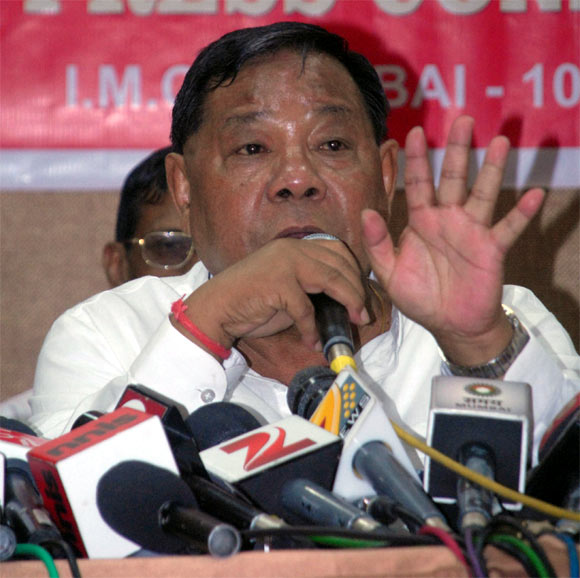
The Supreme Court on Thursday began hearing former Lok Sabha Speaker P A Sangma's plea challenging the election of Pranab Mukherjee as President.
A constitution bench headed by Chief Justice Altamas Kabir posted the matter for further consideration on November 20 when it will give a chance to various parties for raising preliminary arguments on maintainability of the petition before issuing notice in the matter.
During the preliminary hearing, Sangma will argue to show there was a 'cause of action' for filing the petition. After the preliminary hearing on maintainability, the bench also comprising justices P Sathasivam, S S Nijjar, J Chelameswar and Ranjan Gogoi will decide whether the matter is fit for the regular hearing.
While senior advocate Ram Jethmalani appeared for Sangma, the President was represented by senior advocate Harish Salve. Attorney General G E Vahanvati was assisting the court as a necessary party under the Supreme Court Rules in such matters.
In his petition, Sangma has said the veteran Congress leader was not eligible for the post as he was holding offices of profit on the date of filing nomination for the President's election.
Sangma has contended that Mukherjee was holding offices of profit as chairman of Indian Statistical Institute, Kolkata, and as also the leader of the Congress in the Lok Sabha when he had entered the Presidential race.
The tribal leader from Meghalaya, who had lost the Presidential poll, has sought a direction for setting aside Mukherjee's election as President and declaring him as elected to the post.
Sangma's petition has said that Mukherjee's election as President was 'illegal, void ab-initio and liable to be set aside'.
Sangma's petition is not the first of its kind as on several occasions in past, Presidential elections have been challenged in the apex court and the one in which a detail hearing took place was the plea against election of V V Giri as President in 1969.
Backed by Indira Gandhi, Giri had won the Presidential election as an independent candidate by defeating the official Congress nominee Neelam Sanjeeva Reddy by a conscience vote.
A petition was filed in the Supreme Court for seeking to set aside Giri's election allegedly for resorting to corrupt practices to influence voters. The petition was dismissed on September 14, 1970 after a marathon hearing in which a large number of politicians were called to depose as witness by a five-judge Constitution Bench.
Giri was given the option to give his statement to the court-appointed commissioner but he had preferred to depose in person before the apex court. In his petition, Sangma, whose objections against the nomination of Mukherjee, was rejected by the returning officer, has submitted that the apex court should summon entire records relating to the case and hold a trial before deciding the issues raised in the petition.
The petition by Sangma, who resigned from the Nationalist Congress Party for contesting the Presidential election, has said that among the several objections, the returning officer did not decide the issue regarding the genuineness of the signatures on the purported resignation letter of Mukherjee from the post of Chairman of Indian Statistical Institute.
Further, his petition has said that on July 3 he and Mukherjee were declared to be the only two duly nominated candidates for the Presidential election and Congress leader's name was deleted from the website of the Institute late in the afternoon on July 2, soon after the adjournment of the proceedings before the returning officer.










 © 2025
© 2025